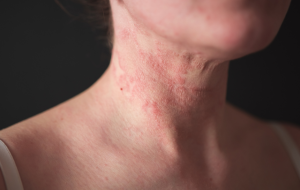What is Dermatitis in TCM?
 Dermatitis manifests as skin inflammation, itching, and redness, often accompanied by dry, scaly patches. Traditional Chinese Medicine (TCM) views dermatitis as stemming from internal imbalances, such as disruptions in Qi, Blood, Yin, and Yang energies. TCM practitioners diagnose based on individual disharmony patterns, like excess heat or dampness.
Dermatitis manifests as skin inflammation, itching, and redness, often accompanied by dry, scaly patches. Traditional Chinese Medicine (TCM) views dermatitis as stemming from internal imbalances, such as disruptions in Qi, Blood, Yin, and Yang energies. TCM practitioners diagnose based on individual disharmony patterns, like excess heat or dampness.
Acupuncture and TCM herbs provide holistic management by addressing these imbalances. Acupuncture can regulate Qi flow through specific acupoints, reducing inflammation and alleviating itching. TCM herbs can clear heat and soothe the skin, administered internally or externally. They not only treat symptoms but also target root causes, promoting overall skin health.
Causes of Dermatitis
In TCM, dermatitis is understood to arise from internal imbalances affecting the body’s Qi, Blood, Yin, and Yang energies. These imbalances can be influenced by various factors, leading to the development of dermatitis. Some common causes of dermatitis from the perspective of Acupuncture and TCM Herbs include:
- Excess Heat: Excessive internal heat in the body can manifest as inflammation and redness on the skin, contributing to dermatitis. This heat may arise from factors such as emotional stress, spicy foods, alcohol consumption, or environmental heat exposure.
- Dampness: Dampness refers to an accumulation of moisture or fluids in the body, leading to heaviness, swelling, and stagnation. Dampness can exacerbate dermatitis by creating a damp environment on the skin, promoting the growth of fungi and bacteria. Factors such as excessive humidity, poor diet, and weak Spleen function can contribute to dampness.
- Blood Stagnation: Stagnation of Blood circulation can impair the nourishment and oxygenation of the skin, leading to inflammation, itching, and redness associated with dermatitis. Blood stagnation may result from factors such as trauma, injury, or poor circulation due to sedentary lifestyle habits.
- Yin Deficiency: Yin represents the cooling, nourishing, and moisturizing aspects of the body. A deficiency of Yin can lead to dryness, heat, and irritation in the skin, contributing to dermatitis. Yin deficiency may be caused by factors such as aging, chronic stress, excessive sweating, or hormonal imbalances.
- Wind Invasion: In TCM, wind is considered an external pathogenic factor that can invade the body and disrupt the skin’s protective barrier, leading to inflammation and itching associated with dermatitis. Wind invasion may occur during windy weather or exposure to drafts, exacerbating existing skin conditions.
Acupuncture and TCM herbs aim to rebalance the body’s internal energies and address the underlying causes of dermatitis. Acupuncture regulates Qi flow and reduces inflammation, while TCM herbs clear heat, eliminate dampness, nourish Yin, and soothe the skin.
What self-care Method Can Help Dermatitis?
- Maintain Good Hygiene: Keep the affected skin clean and dry to prevent bacterial or fungal infections. Use gentle cleansers and moisturizers free of fragrances and harsh chemicals.
- Identify and Avoid Triggers: Determine and avoid triggers that worsen dermatitis symptoms, such as certain foods, allergens, environmental factors, and stress.
- Regular Moisturization: Moisturize the skin regularly to maintain hydration and prevent dryness and itching. Opt for hypoallergenic and non-comedogenic products suitable for sensitive skin.
- Wear Comfortable Clothing: Choose loose-fitting, breathable clothing made from soft fabrics like cotton to minimize irritation and friction on the skin.
- Stress Management: Practice stress-relief techniques such as meditation, deep breathing exercises, or yoga to reduce stress levels, which can exacerbate dermatitis symptoms.
- Healthy Diet: Maintain a balanced diet rich in fruits, vegetables, whole grains, and lean proteins to support overall skin health and reduce inflammation.
- Avoid Scratching: Refrain from scratching or rubbing the affected skin to prevent further irritation and inflammation. Instead, use cold compresses or anti-itch creams to soothe itching.
- Stay Hydrated: Drink plenty of water throughout the day to keep the skin hydrated from within and support its natural barrier function.
- Sun Protection: Protect the skin from harmful UV rays by wearing sunscreen with a high SPF, seeking shade, and wearing protective clothing, especially if sun exposure worsens dermatitis.
Incorporating these self-care practices into your daily routine can help manage dermatitis symptoms and promote healthier skin.
How Can We Help?
At Happipuncture, we offer personalized treatment plans tailored to your specific dermatitis symptoms and overall health goals. We take a holistic approach, considering emotional and lifestyle factors, and provide education and support for long-term management.
Through collaborative care with other healthcare providers, we aim to achieve lasting relief and improved skin health. Contact us today to learn more about how we can support you on your journey to healthier skin.




